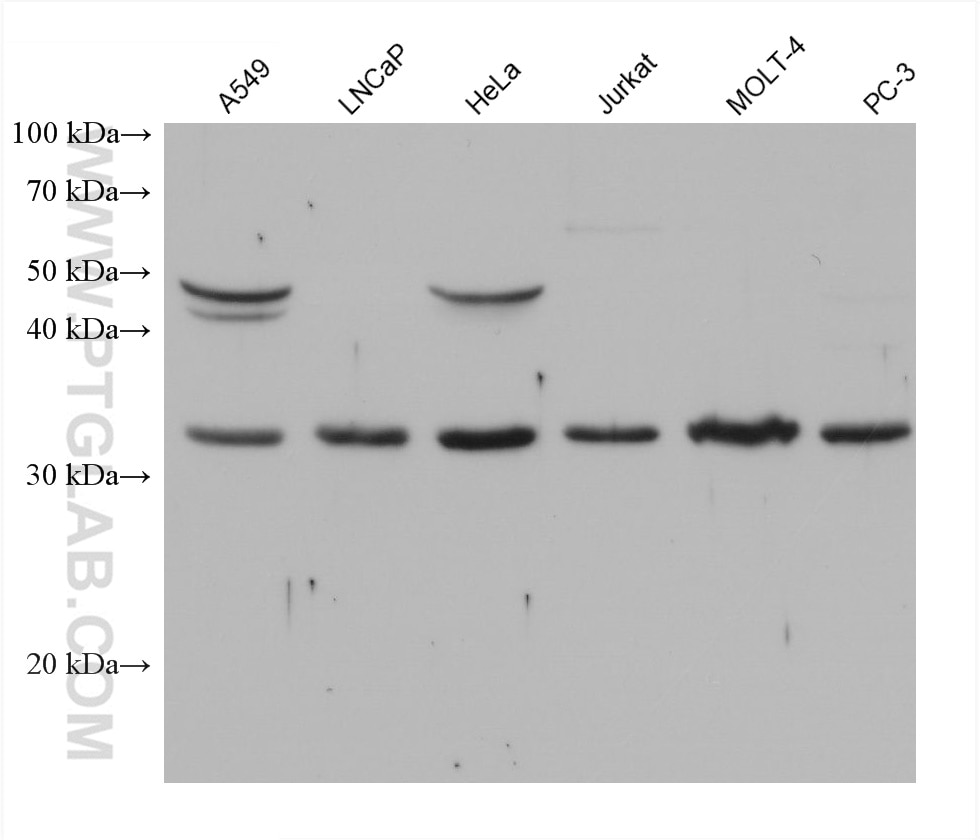CDK5 Monoklonaler Antikörper
CDK5 Monoklonal Antikörper für WB, ELISA
Wirt / Isotyp
Maus / IgG1
Getestete Reaktivität
human
Anwendung
WB, ELISA
Konjugation
Unkonjugiert
CloneNo.
1B9E1
Kat-Nr. : 68514-1-Ig
Synonyme
Galerie der Validierungsdaten
Geprüfte Anwendungen
| Erfolgreiche Detektion in WB | A549-Zellen, HeLa-Zellen, Jurkat-Zellen, LNCaP-Zellen, MOLT-4-Zellen, PC-3-Zellen |
Empfohlene Verdünnung
| Anwendung | Verdünnung |
|---|---|
| Western Blot (WB) | WB : 1:5000-1:20000 |
| It is recommended that this reagent should be titrated in each testing system to obtain optimal results. | |
| Sample-dependent, check data in validation data gallery | |
Produktinformation
68514-1-Ig bindet in WB, ELISA CDK5 und zeigt Reaktivität mit human
| Getestete Reaktivität | human |
| Wirt / Isotyp | Maus / IgG1 |
| Klonalität | Monoklonal |
| Typ | Antikörper |
| Immunogen | CDK5 fusion protein Ag28465 |
| Vollständiger Name | cyclin-dependent kinase 5 |
| Berechnetes Molekulargewicht | 31 kDa, 33 kDa |
| Beobachtetes Molekulargewicht | 33 kDa |
| GenBank-Zugangsnummer | BC005115 |
| Gene symbol | CDK5 |
| Gene ID (NCBI) | 1020 |
| Konjugation | Unkonjugiert |
| Form | Liquid |
| Reinigungsmethode | Protein-G-Reinigung |
| Lagerungspuffer | PBS mit 0.02% Natriumazid und 50% Glycerin pH 7.3. |
| Lagerungsbedingungen | Bei -20°C lagern. Nach dem Versand ein Jahr lang stabil Aliquotieren ist bei -20oC Lagerung nicht notwendig. 20ul Größen enthalten 0,1% BSA. |
Hintergrundinformationen
Cyclin-dependent kinase 5 (CDK5), belongs to the cyclin-dependent kinase family, is a proline-directed serine/threonine-protein kinase that essential for neuronal cell cycle arrest and differentiation and may be involved in apoptotic cell death in neuronal diseases by triggering abortive cell cycle re-entry. CDK5 predominantly expressed in neurons where it phosphorylates both high molecular weight neurofilaments and microtubule-associated protein tau.
Protokolle
| Produktspezifische Protokolle | |
|---|---|
| WB protocol for CDK5 antibody 68514-1-Ig | Protokoll herunterladen |
| Standard-Protokolle | |
|---|---|
| Klicken Sie hier, um unsere Standardprotokolle anzuzeigen |


